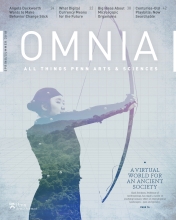An Uncommon Perspective
What's the next best thing to walking in someone else’s shoes? Seeing the world through their eyes. Our cover story, “A Virtual World for an Ancient Society,” (p.16) explores a digital world that recreates and populates pre-Columbian agricultural societies. The figures are created in part through motion capture footage of students using tools contemporary to the time and place. It's one of the many ways Penn Arts and Sciences is using technology as a means to advance knowledge.
In “Prospecting Playbills,” (p.42) OMNIA follows researchers on their journey to create an archive of playbills for 18th- and 19th-century dramatic performances, which will provide unique abilities to research the lifespan of plays, as well as map out actors and actresses' career trajectories—all the way to the famous London theaters.
On the flip side of the digital coin, we spoke with an economist about the hot topic of cryptocurrency and how properties like Bitcoin and technology like block chain might change our financial landscape forever (p. 32).
A focus on the virtual has also led to the development of a new minor spearheaded by the Price Lab for Digital Humanities (p. 4), designed for students who want to augment their studies in the humanities or social sciences with digital research techniques and engagement with questions raised by digital humanities.
Another overarching theme in the issue is perseverance. Whether it's one professor’s commitment to understand what makes young students succeed, and to apply that knowledge to society-at-large (p. 24), or the decades-long research study examining how Malawians faced with the trials and tribulations of disease and famine face down these threats (p. 8), our experts are focused on understanding how people from all walks of life overcome obstacles.
The next generation of scholars—our ambitious undergrad and graduate students—are at the forefront of examining complex social issues, highlighted in this issue for tackling topics like the intersection of Black feminism and social media (p. 54), whether social class affects immigrants’ involvement in their children’s education (p. 56), and how Islamophobia affects politics (p. 55).
We at OMNIA strive to expose the reader to the myriad perspectives our outstanding faculty, students, and alums offer on the critical issues affecting our global community. Thanks for traveling the path with us.



